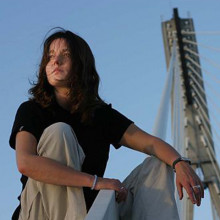Polish literature

Marzena Broda
Born 1966, Marzena Broda is a poet, novelist, playwright and screenwriter, as well as co-founder of the Skaza theatre group.
Broda debuted with The Light of Space, a volume of poetry published in 1990 that was regarded as one of the more interesting poetry books to appear since the watershed year of 1989. For several years, Broda lived abroad, in the US and Germany, which was reflected in her next few works, such as her novels Don’t Touch Norman Hammer and Luka as well as in her play The Flaw, all of which are set in America.
At first Broda focused on poetry, creating a subtle feminine lyricism. As Stanisław Balbus wrote about her poems: “Precision, neatness and economy, as well as exuberance, a forceful imagination and a sharp creative view of things are combined here with an ability to elicit their universal meanings and bring them into a metaphysical perspective where each thing, each entity presented in the one-off flash of a sensory epiphany is at the same time an inhabitant of the cosmos”.
Later, she concentrated on fiction and drama. Broda’s main characters are often flawed, marked by an acute nonconformity that causes them to struggle with themselves and the world, which they refuse or cannot accept. The root of their problems is usually in traumatic past experiences; the title hero of the novel Don’t Touch Norman Hammer was abused by his adoptive father, and the siblings in The Flaw are victims of violence and sexual exploitation, which finally pushes them into an incestuous relationship. Broda subjects her main characters’ psyche to a painful vivisection, exposing all sorts of traumas and fears, and featuring helplessness and confusion. In her books, the plot plays a lesser role and is usually fragmentary and vestigial. Often, as in Luka, it ranges from hard reality to delusion and fabrication; her maim aim is to portray spiritual landscapes and record all sorts of emotional shudders, to which her unique style full of symbols and subtle lyricism is well suited.
BIBLIOGRAPHY
- Światło przestrzeni, Oficyna Literacka, Kraków 1990.
- Cudzoziemszczyzna, a5, Poznań 1995.
- Nie dotykać Normana Hammera, Muza S.A., Warszawa 2004.
- Luka, REBIS, Poznań 2005.
- Prawo brzoskwinki do gromu, Instytut Mikołowski, Mikołów 2008.
- Zwykłe rzeczy, Nisza, Warszawa, 2013.
TRANSLATIONS
English:
- in: Young poets of a new Poland / K. Lars [et al.]. London: Forest Books: UNESCO, 1993.
French:
- in: Poésie (sel. by Karl Dedecius), Paris: Éd. Noir sur Blanc, 2000.
German:
- Nach den Gewittern (ed. Klaus-Dieter Sommer), Göttingen: Steidl, 1995.
- Poesie, trans. Karl Dedecius, Zürich: Ammann, 1996.
- Das Unsichtbare lieben, sel by. Dorota Danielewicz-Kerski, Köln: K. Gutke, 1998.
Italian:
- Inattese vertigini, trans. Alessandro Amenta, Lorenzo Costantino, Udine: Forum, 2010.
Spanish:
- Poesía a contragolpe, sel. and trans. Gerardo Beltrán, Abel A. Murcia, Xavier Farré, Zaragoza: Prensas Univ. de Zaragoza, 2012.
Swedish:
- in: 17 Polska Poeter (ed. Irena Grönberg), Stockholm: FIB:s Lyrikklubb, 2003.